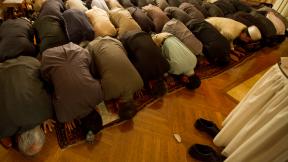
Maasha Allah, the blessed month of Ramadan is nearly upon us. This is a month of fasting, introspection, and community connectedness. Fasting during the month of Ramadan is ordained in the Quran and is a form of Ibadah (worship) that is for Allah, alone. It is a beautiful time that we all look forward to and it deserves to be fully realized by us preparing ourselves in advance for this wonderful, auspicious occasion.
Let us equip ourselves spiritually, mentally and physically BEFORE we begin the blessed fast.
Spiritually
- Niyyah (Intention): Our intentions are the very justification of every action that we take and relate to our motive and goal. As we move toward the start of Ramadan, we can begin to spiritually connect with this month by making intentions to fast and increase our Ibadah (worship). This can be with extra prayers, intentions to read the whole of the Quran, which is broken down into 30 juz (parts) for that very purpose, intentions to perform good deeds and offer kindness to others, as well as intentions to exercise self-control and exhibit the best Adab (manners).
"Verily actions are by intentions, and for every person is what he intended. So the one whose Hijrah (migration) was to Allah and His Messenger, then his Hijrah was to Allah and His Messenger. And the one whose Hijrah was for the world to gain from it, or a woman to marry her, then his Hijrah was for what he made Hijrah for"
(Bukhari and Muslim).
- Nafs: The essence of who we are is our Nafs (soul). As we embrace Ramadan, that Nafs seeks to totally and utterly submit to Allah, the Most High. We humble ourselves before Our Lord, thinking and calling on Him in remembrance. As we prepare for Ramadan we can come willingly and obediently to the five daily prayers, beautifying them with sincerity and shyness as we call upon Allah.
Mentally
- Wasilah – the means to access: In Islam, Wasilah is the means by which we approach or attain something. During the month of Ramadan, we seek to attain closeness with Allah. In order to obtain this closeness we must first clear our minds of those things that would detract from what we want to accomplish during this month. That means that as we prepare for Ramadan, we begin to refocus our mental energies and attitudes. We mentally prioritize the significance of the month as well as our expected Ibadah (worship).
Part of our mental preparation is to make a conscious effort to participate fully in this month. When we are conscious we are aware, certain, and vigilant. In order for us to have a successful Ramadan, we must commit ourselves to move toward that goal. Fasting is a personal Ibadah even while we perform it as a collective Ummah. However, there is much reward in formulating a plan and strengthening our resolve for the month. In the Quran, Allah teaches the believer in Surah Najm – The Star in verses 39 and 40 “And there is not for man except that [good] for which he strives, and his effort is going to be seen”
O believers! Be mindful of Allah and seek what brings you closer to Him
and struggle in His Way, so you may be successful.
(Quran 5:35)
Physically
- Fasting: When Ramadan begins, the start of the fast can be jarring to our bodies. To prepare for this holy month, we can follow the tradition of Prophet Muhammad, God’s peace and blessings be upon him, who was reported to have observed a fast often during the month of Shaban. As the month approaches, you can fast on Monday and Thursday to attune your body to the abstinence and begin the process of curbing cravings.
Aisha, may God be pleased with her, said,” the Prophet would fast until we said he would never break his fast, and he did not fast until we said he would never fast. I did not see the Prophet complete an entire month of fasting except for Ramadan, and I did not see him complete more voluntary fasts than in the month of Shaban” (the Islamic month preceding Ramadan) (Bukhari).
- Schedule: Ramadan offers much in terms of collective and personal Ibadah. Preparing a schedule is helpful in being able to fully take advantage of the special blessings of the month. This may be a schedule of meals to be prepared, groceries to be bought, volunteer activities to participate in, Iftars to attend etc. By considering your family’s particular needs and intentions, the best decisions can be made. For example, if the family considers in advance whether they will do Tarawih (extra prayers offered in Ramadan after the late night prayer) at home or at the Masjid and on what days or at which Masjid, then it is easier to achieve because you work towards that goal. There is always room for spontaneity, but most Muslim women would agree and share, how making a schedule of meals and participation level for their children, helps them organize so they too are able to enjoy all the precious moments of this blessed month.
- Health: The fast during the month of Ramadan can tire the body. Before we begin fasting, ensure that if you are a person with chronic health conditions like diabetes or heart disease, that you have checked with your health care professional confirming that you will be able to fast this year. Even if you do not have health concerns, remember to prepare yourself to eat in the best manner. Cut out caffeine, which can raise thirst levels. Eat whole grains which are high in fiber and digest slowly in the body, controlling both sugar levels and hunger. Before the fast begins, make a choice to be healthy. The meals for iftar, dinner, Suhoor (the pre-dawn meal in Ramadan) can and should be simple, but they should also be nutritious. When the days of fasting are long like they are in the spring and summer, plan on increasing your exercise level. This is of course best accomplished by increasing your physical Ibadah with the Tarawih prayers.
It is almost Ramadan – Alhumdulillah!








Add new comment